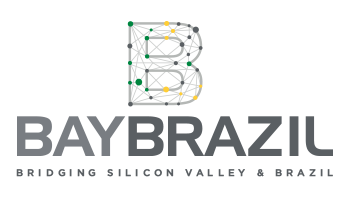On Jan 29, we had a conversation with Eduardo Lins Henrique, Head of Movile in U.S. and a mentor at BayBrazil Mentor program for Brazilian entrepreneurs.
BayBrazil: How was the process of moving from Campinas do Mountain View to set up Movile’s operations in the U.S.?
Eduardo: Me and our CEO, Fabricio Bloisi, came several times to Silicon Valley to study the market and the region in 2011. After this we decided to open our operations in the Valley. I chose Mountain View specially because me and my family could be close from some other friends that live there. With this solved, we stablished our offices at Castro st. From our place we can drive in 10min to Google, 15min to Apple and 15min to Facebook. All these companies are very strategic to our business.
BayBrazil: Movile has a large presence in Latin America. What is the company’s strategy to growth in the U.S. market?
Eduardo: Movile is in US focused on smartphones apps. We are launching our apps for iOS, Androids and HTML5 devices. For 2013 we have plans to release at least 10 applications targeting the Hispanic community in US and Kids below 12. Some will be Utilities apps and some others will be Entertainment apps.
BayBrazil: What are the trends in the mobile entertainment services industry?
Eduardo: Video integrated with social is a big trend worldwide. The is no company on videos that had a similar success than Instagram had on photos. Smartphones can help users to interact while they are watching TV, this is called 2nd screen experience, and this is a trend for 2013 as well. In Latin America, I believe that we will see an explosion of low-end Android devices. We may see the middle class accessing internet for the first time using these devices and this can be a big revolution.
BayBrazil: Tell us about the mobile market in Brazil? Why are there more mobile phones than people in Brazil?
Eduardo: The Brazilian mobile market has about 80% of pre-paid phones. Usually these users use their mobile phones to receive calls and most of the time these lines have no credit. On special feature is that if you use the same carrier of your friend, you can call him for free. This feature made people in Brazil activate 2 or three lines using different operators. For example, if your family use the carrier A, you will have a simcard from the operator A to talk with them, but you can change your simcard to an operator B if you have a lot of friends in this 2nd carrier. It’s curious to see the success of some chinese phones that allow users to use 3 or 4 simcards in the same phone.
BayBrazil: Apple versus Android. Who will lead the mobile war in the Brazilian market?
Eduardo: Definitely Android specially because of low-end smartphones. But this doesn’t mean that Apple will not grow in Brazil. There is a huge market in LatAm for high-end phones like Samsumg Galaxy and iPhone, but the middle class will by Androids.
BayBrazil: How do you see the interest of companies such as Mozilla, which is developing a phone specific for the Brazilian market?
Eduardo: Mozilla is launching a low-end smartphone in Brazil, probably targeting the middle class. Brazil, India and China are the largest markets for these targets, so I think it makes sense. Technically we need to check if the Mozilla “web based” phone will beat Android in terms of usability and apps. The quality and the number of apps is an important point in this game.
BayBrazil: You come from one of the main entrepreneurial clusters in Brazil. Tell us about the startup scene in Campinas?
Eduardo: Campinas has good universities, specially Unicamp and Puccamp what bring very talent people to the city. Unicamp started some years ago some initiatives to promote entrepreneurship around the university. Me and some colleagues came from this. Today I see many entrepreneurs from previous generations coming back to the University trying to promote startup growth what is very important. We founded a group of Angels called Inova Ventures that is a good example. The problem is that we need to help to teach and find entrepreneurs in the University, and unfortunately Unicamp is focused more in the technical skills than entrepreneurial classes. I think today we are plenty of money from investors, but we don’t find good projects and good entrepreneurs prepared to receive investments. If we solve these issues, we will see much more new “Moviles” in the future.
BayBrazil: You are part of BayBrazil’s Mentor program. How important it is for you to give back to Brazil by mentoring young entrepreneurs?
Eduardo: I had the privilege to studied at Unicamp, a public university. I feel committed to give back to Brazilian society what they invested on me. Beside this, I believe that we need to form more entrepreneurs to make Brazil grow faster. In Silicon Valley you see billions of dollars generated from this startups market in this virtuous cycle, but we don’t see this in Brazil. So, I really think that our mentoring can create a “billion dollar company” in a few years and this will help our country to grow. I have a special interest in being close from mobile startups and see how Movile could help them to grow.
BayBrazil: What is your favorite app?
Eduardo: It’s incredible to see Instagram’s history. In 2 or 3 years they created a billion dolar company with 16 people, incredibly focused. Instagram is my favorite company.
In terms of apps, I like many. The new checkin experience that American Airlines if offering is amazing, the m-wallet app from Startbucks is great and very useful, I love to read feeds on Flipboard. My favorite Movile app is FreeZone that helps users to find free wifi hotspots, I’m excited with the opportunities and the roadmap for this app in 2013.








